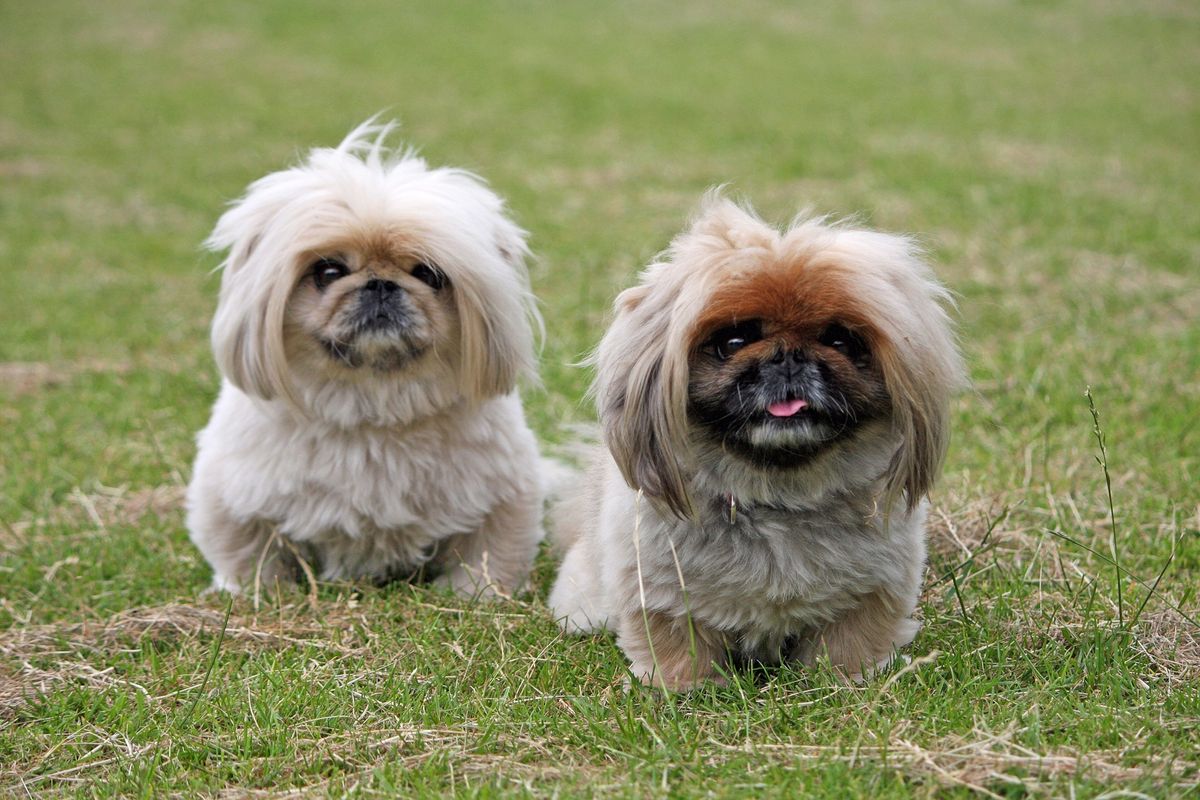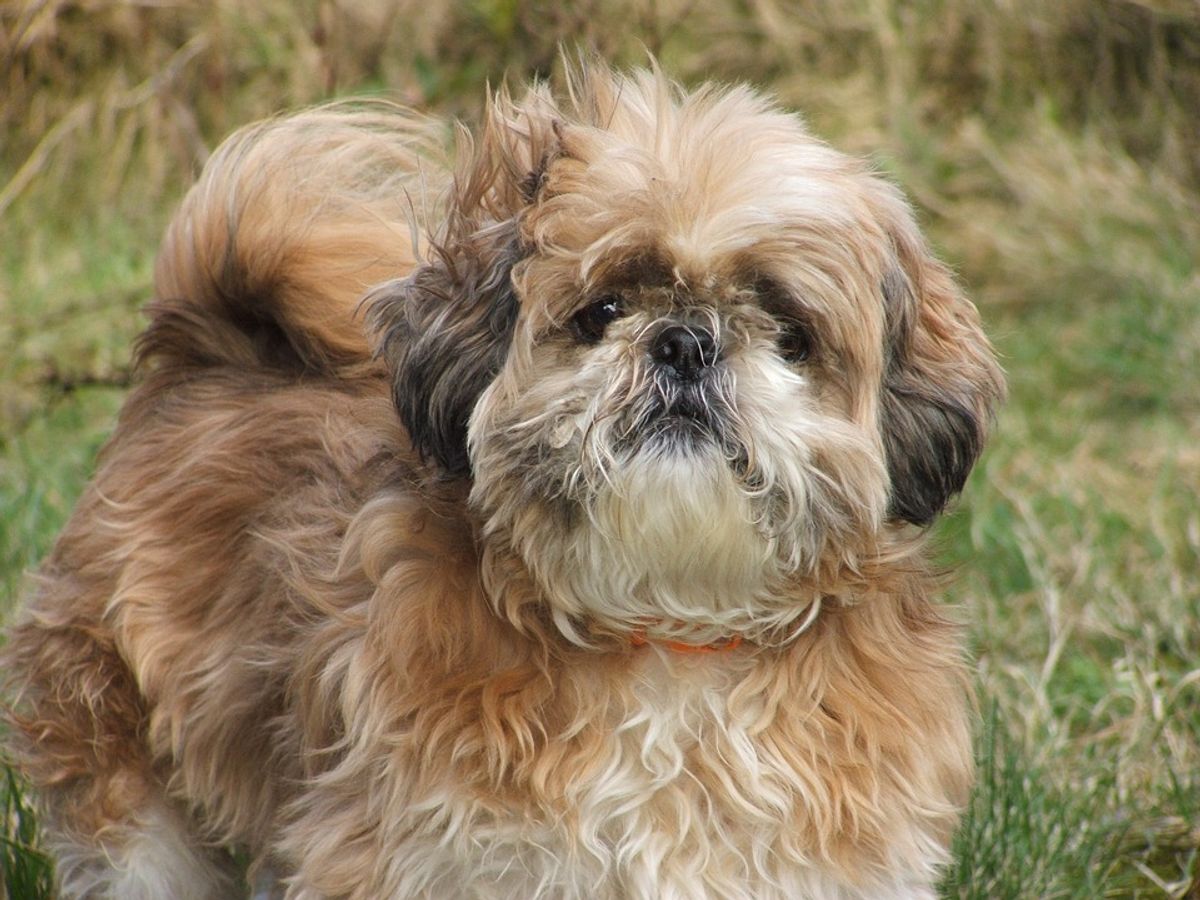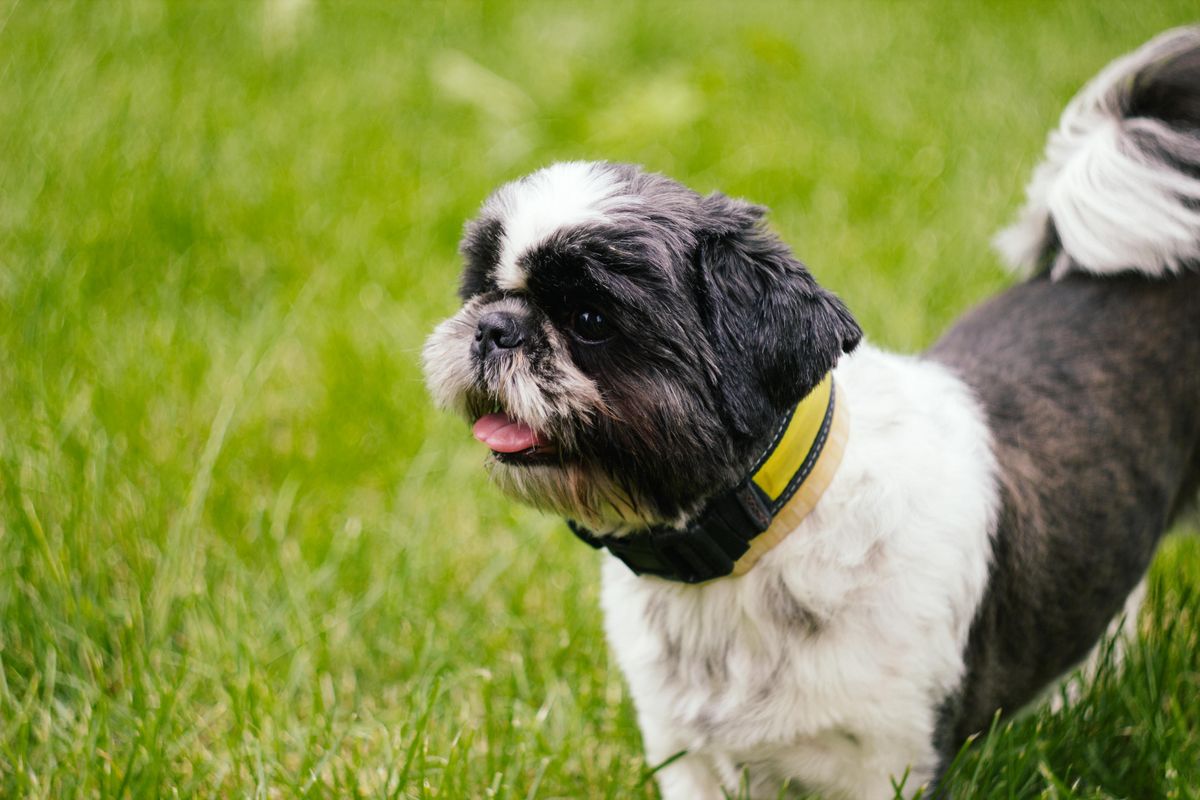The Shih Tzu, a beautiful toy breed with a charming personality, deserves the highest quality meals to maintain their health and vitality. In this comprehensive guide to Shih Tzu nutrition, we’ll cover everything you need to know to provide your beloved pet with the best diet possible.
Key Takeaways
- Combat obesity in Shih Tzus by providing a balanced diet, limiting high-calorie treats, and promoting regular exercise.
- Establish a consistent feeding routine with meals spread throughout the day to maintain stable energy levels and prevent hypoglycemia.
- Tailor your Shih Tzu’s diet to their life stage, ensuring puppies, adults, and seniors get the appropriate nutrients and portion sizes.
- Address special dietary needs by consulting with a veterinarian for conditions like pickiness, overweight, and heart issues.
- Combine a well-balanced diet with an adequate exercise routine to manage your Shih Tzu’s weight and promote overall well-being.
Understanding Shih Tzu Nutritional Needs

Essential Nutrients for Optimal Health
Shih Tzus, like all dogs, require a balanced diet that is rich in certain essential nutrients to maintain their health and vitality. These nutrients include proteins, fats, carbohydrates, vitamins, and minerals. Proteins are crucial for muscle development and repair, while fats provide energy and support cell growth. Carbohydrates are important for energy, and vitamins and minerals are necessary for various bodily functions.
It’s important to ensure that your Shih Tzu’s diet includes a variety of nutrients to promote overall well-being. A deficiency in any of these essential nutrients can lead to health issues.
Here is a list of essential nutrients and their benefits:
- Proteins: Build and repair body tissues
- Fats: Provide energy, support cell growth
- Carbohydrates: Supply a source of energy
- Vitamins: Aid in metabolic processes
- Minerals: Support bone health, nerve function
While Shih Tzus are generally healthy dogs, they may require additional vitamins and nutrients to maintain optimal health. Consulting with a veterinarian can help determine if your Shih Tzu needs any supplements, such as Coco and Luna Milk Thistle, to support their diet.
Common Dietary Issues and Solutions
Shih Tzus, like any other breed, can face a variety of dietary issues that may impact their health and wellbeing. Obesity is a common concern, and it’s crucial to provide a balanced diet, limit high-calorie treats, and encourage regular exercise to combat this problem. Consulting with a veterinarian is essential if there are underlying health conditions contributing to weight gain.
Another issue is the tendency of owners to share human food with their pets, which can lead to excess weight. It’s important to recognize the signs that your Shih Tzu’s food is not being converted to energy effectively. To address this, consider preparing meals that are appropriate for your dog’s size and nutritional needs, and avoid stocking up on leftovers from human meals.
When a Shih Tzu experiences stomach distress, such as vomiting or diarrhea, at-home remedies like Pepto may be used. However, it’s always best to seek professional advice for treatment.
For senior Shih Tzus, dietary adjustments may be necessary. Switching to a prescription senior dog food or a whole foods natural diet can be beneficial. Supplements can also be added under the guidance of a vet to support aspects like cognitive health.
Tailoring Diet to Life Stages
Shih Tzus, like all dogs, have different nutritional needs at various stages of their lives. Puppies grow rapidly during their first year and require a diet rich in protein and calories to support this growth. They usually reach their full height by the age of 6-8 months, but their weight may continue to increase. Adult Shih Tzus, on the other hand, need a balanced diet to maintain their health and energy levels.
As Shih Tzus transition into their senior years, their metabolism slows down, necessitating a diet lower in calories but still rich in nutrients to support aging joints and cognitive function.
It’s important to adjust your Shih Tzu’s diet as they move from one life stage to another. Here’s a simple guide:
- Puppy (up to 1 year): High-calorie, protein-rich food.
- Adult (1-7 years): Balanced diet with moderate calories.
- Senior (7+ years): Lower-calorie diet, possibly with supplements for joint health.
Remember, the activity level also plays a crucial role in determining the right diet. An active senior dog will have different needs compared to an inactive one. Always consult with a vet to tailor the diet to your Shih Tzu’s specific needs.
Developing a Feeding Routine for Your Shih Tzu

Recommended Feeding Schedule
Establishing a consistent feeding routine is crucial for your Shih Tzu’s health and well-being. Adult Shih Tzus should ideally be fed three times a day to maintain stable energy levels and prevent hypoglycemia, a common issue in small breeds. Puppies, due to their developmental needs, may require more frequent meals.
To curb this behavior, only feed them three or four times a day with a set number of treats, and don’t give in to the pressure to give more.
Incorporate healthy snacks between meals to keep your Shih Tzu’s energy levels consistent. However, be mindful of their total daily calorie intake to avoid overfeeding. Monitor your pet for any signs of digestive discomfort and adjust their diet as necessary, especially since Shih Tzus can have sensitive stomachs.
How Often to Feed Shih Tzus
Feeding your Shih Tzu the right amount of food at regular intervals is crucial for their health. Adult Shih Tzus should be fed at least three times a day to maintain stable energy levels and prevent hypoglycemia, a common issue in small breeds. Puppies, due to their growth and higher energy demands, may require more frequent meals.
- Morning meal to start the day
- Mid-day meal to sustain energy
- Evening meal to last through the night
Healthy snacks can be incorporated between meals to maintain energy levels without overfeeding.
Consistency in feeding times helps regulate your Shih Tzu’s digestion and can prevent anxiety around meal times.
Remember, the exact frequency and amount will vary based on your Shih Tzu’s age, weight, activity level, and health condition. Always refer to feeding guidelines and consult with your veterinarian to tailor the feeding schedule to your dog’s specific needs.
Ideal Feeding Amounts
Determining the ideal feeding amounts for Shih Tzus is crucial for their health and well-being. For puppies, the recommended daily intake ranges from 1.0 to 2.0 ounces, which should be increased gradually as they grow. Adult Shih Tzus generally need between 2.0 to 3.4 ounces per day to maintain optimal health. It’s important to note that senior Shih Tzus may have similar dietary needs to adults, but these can vary based on health and activity levels.
To prevent hypoglycemia and ensure stable energy levels, Shih Tzus should be fed multiple times throughout the day. While puppies may need more frequent meals, adults should adhere to a consistent feeding routine.
Feeding your Shih Tzu the right amount is not just about quantity, but also about the quality of the food. Ensure that the diet is balanced and introduce new foods gradually to avoid digestive issues. Remember, the nutritional requirements of a Shih Tzu will change over its lifetime and must be adjusted accordingly.
Choosing the Right Food for Your Shih Tzu

Best Dog Food for Shih Tzu Puppies
When selecting the best dog food for Shih Tzu puppies, it’s crucial to focus on products that cater to their unique dietary requirements during the rapid growth phase. High-quality puppy food that is specifically formulated for Shih Tzus can provide the necessary nutrients for their development.
- Chicken & Sweet Potatoes
- Beef & Pumpkin
- Lamb & Quinoa
These options not only offer a balanced diet but also include fresh, nutritious ingredients essential for a Shih Tzu puppy’s optimal health. The amount of food required varies based on age, weight, activity level, and health condition. It’s important to consult feeding guidelines to determine the right portion sizes for your puppy.
Ensuring your Shih Tzu puppy has access to the right food early on sets the foundation for a healthy and happy life.
For instance, a product like Royal Canin Shih Tzu Puppy Breed Specific Dry Dog Food is designed to meet the nutritional needs of purebred Shih Tzus from 8 weeks to 10 months old. This tailored approach to nutrition is vital for supporting their overall well-being during the formative months.
High-Quality Diet Options for Adult Shih Tzus
When it comes to feeding your adult Shih Tzu, selecting a high-quality diet is crucial for their overall health and well-being. Adult Shih Tzus thrive on a balanced diet that is rich in nutrients and tailored to their specific needs. A diet that includes a variety of proteins, fats, carbohydrates, vitamins, and minerals will support their energy levels, coat health, and digestive system.
One of the top recommendations for adult Shih Tzus is the Wellness Complete Health Small Breed Adult formula. This diet is crafted with the needs of small breeds in mind, providing a balanced blend of nutrients that cater to the Shih Tzu’s unique requirements. It’s important to consider options that are designed specifically for small breeds like the Shih Tzu to ensure that the kibble size and nutrient ratios are appropriate.
When transitioning your Shih Tzu to a new diet, it’s essential to do so gradually to avoid digestive upset. Start by mixing a small amount of the new food with the current diet, and slowly increase the proportion over the course of a week.
Always consult with your veterinarian before making any changes to your dog’s diet, especially if your Shih Tzu has any health concerns or dietary restrictions. They can provide personalized advice and recommendations based on your dog’s individual health status.
Adjusting Diet for Senior Shih Tzus
As Shih Tzus enter their senior years, their metabolism slows down, and their dietary needs change. It’s crucial to adjust their diet to maintain a healthy weight and support aging joints and organs. Reducing calorie intake while maintaining nutrient density is key for senior Shih Tzus.
- Monitor calorie intake to prevent weight gain.
- Incorporate foods rich in omega-3 fatty acids for joint health.
- Ensure adequate protein to maintain muscle mass.
- Consider supplements for digestive and immune support.
Adjusting the diet of a senior Shih Tzu requires a delicate balance to ensure they receive all the necessary nutrients without excess calories that can lead to weight gain. Regular veterinary check-ups can help tailor the diet to your Shih Tzu’s specific health needs.
Remember, as activity levels decrease, so should the calorie content of their meals. Consult with your veterinarian to create a diet plan that caters to your senior Shih Tzu’s changing needs.
Addressing Special Dietary Concerns

Managing Overweight Shih Tzus
Combatting obesity in Shih Tzus requires a multifaceted approach. A balanced diet, limited high-calorie treats, and regular exercise are fundamental. It’s crucial to consult with a veterinarian, especially if underlying health conditions may be contributing to weight gain.
Overweight Shih Tzus may need a tailored diet plan to safely reduce their weight. This plan should be designed to meet their nutritional needs while cutting back on excess calories.
To help manage your Shih Tzu’s weight, consider the following steps:
- Evaluate your Shih Tzu’s current diet and identify areas where calorie intake can be reduced.
- Replace high-calorie treats with healthier, low-calorie alternatives.
- Increase physical activity gradually, aiming for at least 30 minutes to an hour of exercise per day.
- Monitor your Shih Tzu’s weight regularly to track progress and make necessary dietary adjustments.
Catering to Picky Eaters
Catering to the tastes of a picky Shih Tzu can be challenging, but it’s essential for their health and well-being. Offer a variety of foods to discover what your dog prefers. This can include different textures and flavors from reputable brands such as Hill’s Science Diet, Royal Canin, or Blue Buffalo.
To entice your Shih Tzu, consider warming the food slightly or adding a small amount of a flavorful topper, such as a dash of salmon oil or chicken broth. Always ensure that any additions are safe and suitable for your dog’s dietary needs.
It’s important to maintain a balance between catering to your dog’s preferences and ensuring they receive all the necessary nutrients. Avoid the temptation to overindulge with treats or human food, which can lead to weight gain and other health issues.
If your Shih Tzu remains uninterested in their meals, consult with a veterinarian. They may recommend a specialized diet or supplements to ensure your dog is not missing out on essential nutrients.
Dietary Adjustments for Heart Conditions
Shih Tzus with heart conditions require a diet that supports cardiac health. A low-sodium diet is crucial for managing fluid retention, a common issue in dogs with heart problems. It’s important to include nutrients that are beneficial for heart health, such as taurine, omega-3 fatty acids, and antioxidants.
Consulting with a veterinarian is essential to tailor a diet plan that meets the specific needs of your Shih Tzu with a heart condition. They can recommend appropriate dog food brands and formulations. For instance, the Top 5 Dog Foods for Dogs With Congestive Heart Failure can be a starting point for selecting a suitable diet.
Regular monitoring and adjustments to the diet are necessary to ensure that your Shih Tzu maintains a healthy weight and optimal heart function. Weight management is also a key component, as obesity can exacerbate heart conditions.
Remember, each dog is unique, and what works for one may not work for another. Close collaboration with your vet will help manage your Shih Tzu’s condition effectively.
Exercise and Weight Management

The Role of Physical Activity in Weight Control
Physical activity plays a pivotal role in managing your Shih Tzu’s weight. Regular, appropriate exercise is not only beneficial for weight loss but also vital for your pet’s overall health. Due to their small stature, Shih Tzus require exercise routines tailored to their specific needs to prevent injury and ensure they stay active and healthy.
Before starting any weight loss regimen, it’s crucial to consult with a veterinarian to rule out any underlying conditions that may be contributing to weight gain. Once cleared, a structured exercise program can be developed. This should be coupled with a sensible diet, where treats are minimized and food intake is carefully monitored to avoid sudden reductions that could harm your pet.
Exercise consistency is key, even during challenging weather conditions like the peak winter months. If outdoor activities are limited, consider adjusting your Shih Tzu’s calorie intake to match the decrease in physical activity.
Walking is an excellent, low-impact exercise that can be easily integrated into your Shih Tzu’s daily routine. Start with short walks and gradually increase the duration to help your dog burn calories without causing exhaustion or injury.
Creating an Exercise Routine for Your Shih Tzu
Developing an exercise routine for your Shih Tzu is crucial for their overall health and happiness. Shih Tzus require at least 30 minutes to an hour of exercise per day, ideally split into two sessions. This can include walks, playtime, and other activities to keep them engaged and active.
Consistency is key when establishing an exercise routine. Aim to exercise your Shih Tzu at the same times each day to create a habit that both you and your pet can look forward to.
Incorporate a variety of activities to maintain your Shih Tzu’s interest and cater to their energetic nature. Here are some suggestions:
- Morning and evening walks to explore new scents and environments
- Playtime with toys to stimulate their mind and body
- Indoor games and activities, especially during inclement weather
Remember, exercise isn’t just about physical health; it’s also about mental stimulation. Keep your Shih Tzu engaged with fun games and indoor activities, which are essential for dogs of all ages and any size house.
Monitoring Your Shih Tzu’s Weight and Body Condition
Regular monitoring of your Shih Tzu’s weight and body condition is crucial for early detection of weight issues. Use the Body Condition Score (BCS) as a tool to determine if your pet is underweight, at an ideal weight, or overweight. This score ranges from 1 to 9, with 1 being very underweight and 9 being obese.
Consistent tracking of your Shih Tzu’s BCS and weight can help identify trends and make necessary dietary or exercise adjustments.
To effectively monitor your Shih Tzu’s condition, consider the following steps:
- Weigh your Shih Tzu regularly, at least once a month.
- Record the weight and BCS in a log to track changes over time.
- Compare your pet’s current condition to previous records to assess progress.
- Consult with your veterinarian if you notice any concerning weight changes or trends.
Conclusion
In conclusion, managing the weight of a Shih Tzu requires a multifaceted approach that includes providing a balanced diet, establishing a consistent feeding schedule, and ensuring regular exercise. By understanding the common dietary issues and the specific needs of Shih Tzus at different life stages, from puppyhood to adulthood, pet owners can promote a healthy lifestyle for their furry companions. It’s essential to tailor the diet to the individual dog’s preferences, health conditions, and energy requirements, and to consult with a veterinarian for personalized advice. Remember, a healthy Shih Tzu is a happy Shih Tzu, and with the right care and nutrition, your pet can enjoy a vibrant, active life.
Frequently Asked Questions
What essential nutrients are crucial for a Shih Tzu’s optimal health?
Shih Tzus require a balanced diet that includes proteins, fats, carbohydrates, vitamins, minerals, and water to maintain their health and vitality.
How can I manage my overweight Shih Tzu?
Combat obesity in Shih Tzus by providing a balanced diet, limiting high-calorie treats, and encouraging regular exercise. Consult with a veterinarian for advice on any underlying health conditions.
What is the recommended feeding schedule for a Shih Tzu?
Establish a routine with morning, mid-day, and evening meals to ensure your Shih Tzu receives consistent nourishment. Healthy snacks can be incorporated to maintain energy levels between meals.
How do I cater to my picky Shih Tzu eater?
Encourage healthy eating habits by offering nutritious, enticing meals and reducing reliance on high-value treats. Experiment with different food options to discover your dog’s preferences.
What type of exercise is best for Shih Tzus?
Shih Tzus benefit from daily walks, playtime, and interactive games that provide both physical activity and mental stimulation. Tailor the exercise routine to your dog’s age, health, and energy levels.
How do I adjust my senior Shih Tzu’s diet?
Senior Shih Tzus may require dietary adjustments for lower calorie intake, enhanced fiber for digestion, and added joint-supporting supplements. Consult a vet to tailor the diet to your senior dog’s specific needs.




